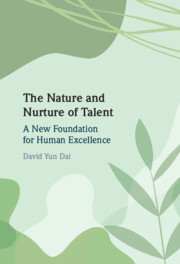Book contents
- The Nature and Nurture of Talent
- The Nature and Nurture of Talent
- Copyright page
- Dedication
- Contents
- Illustrations
- Foreword
- Acknowledgments
- Introduction Rationale, Goals, and Overview of the Book
- Chapter 1 The Evolving Complexity Theory of Talent Development
- Chapter 2 The Question of What Develops
- Chapter 3 The Question of How Talent Develops
- Chapter 4 The Question of When Critical Events Should Take Place
- Chapter 5 The Question of Where
- Chapter 6 How ECT Explains Various Talent Achievements
- Chapter 7 ECT in a Broader Landscape of Theoretic Models
- Chapter 8 Implications of ECT for Talent Identification and Assessment of Developmental Progressions
- Chapter 9 Implications of ECT for Promoting Human Excellence
- Chapter 10 Implications of ECT for Research Methodology
- Epilogue Is AI a Threat to Human Excellence?
- Postscript
- Glossary
- References
- Index
Chapter 7 - ECT in a Broader Landscape of Theoretic Models
What Is New?
Published online by Cambridge University Press: aN Invalid Date NaN
- The Nature and Nurture of Talent
- The Nature and Nurture of Talent
- Copyright page
- Dedication
- Contents
- Illustrations
- Foreword
- Acknowledgments
- Introduction Rationale, Goals, and Overview of the Book
- Chapter 1 The Evolving Complexity Theory of Talent Development
- Chapter 2 The Question of What Develops
- Chapter 3 The Question of How Talent Develops
- Chapter 4 The Question of When Critical Events Should Take Place
- Chapter 5 The Question of Where
- Chapter 6 How ECT Explains Various Talent Achievements
- Chapter 7 ECT in a Broader Landscape of Theoretic Models
- Chapter 8 Implications of ECT for Talent Identification and Assessment of Developmental Progressions
- Chapter 9 Implications of ECT for Promoting Human Excellence
- Chapter 10 Implications of ECT for Research Methodology
- Epilogue Is AI a Threat to Human Excellence?
- Postscript
- Glossary
- References
- Index
Summary
Chapter 7 uses a set of criteria developed by Ford’s living systems approach and Sameroff’s developmental science of the nature–nurture issue to evaluate ECT with respect to whether ECT satisfies these criteria for addressing various aspects of high-level functioning and developmental underpinnings of excellence. Using these criteria, ECT can be viewed as a person-centered theory of talent development and human excellence that is quite versatile in its explanatory power vis-à-vis a wide range of talent achievement phenomena. In comparison with existing component and process models of TD, ECT goes beyond the nature–nurture dichotomy in addressing a deeper issue often neglected in the mainstream scientific discourse, the role of evolving individuality through culture. Looking into the future, the main challenge for ECT is how to align with developmental science, and how to form intertheoretical dialogues with other branches of research on developmental diversity (e.g., developmental psychopathology and developmental criminology) as branches of developmental sciences, all concerned with improving human conditions (i.e., use-inspired).
Keywords
- Type
- Chapter
- Information
- The Nature and Nurture of TalentA New Foundation for Human Excellence, pp. 154 - 177Publisher: Cambridge University PressPrint publication year: 2024



